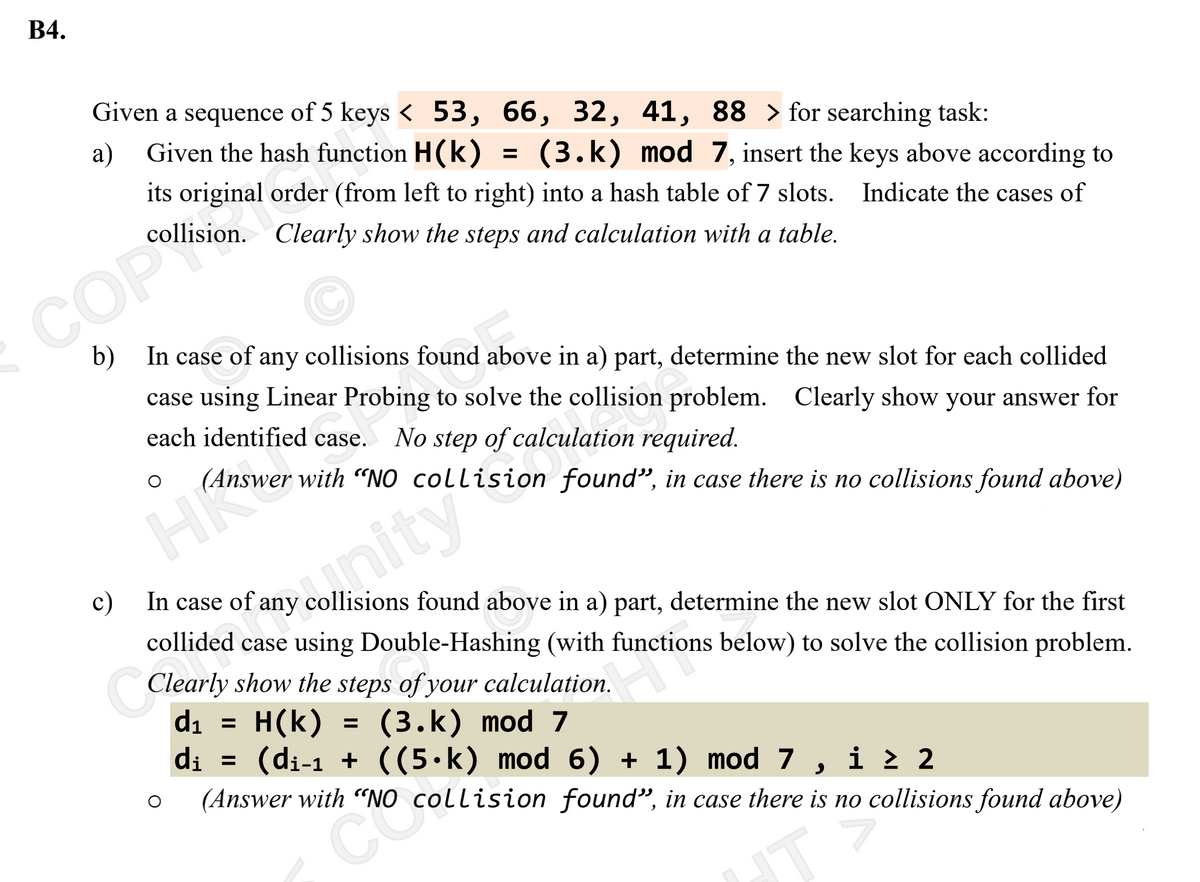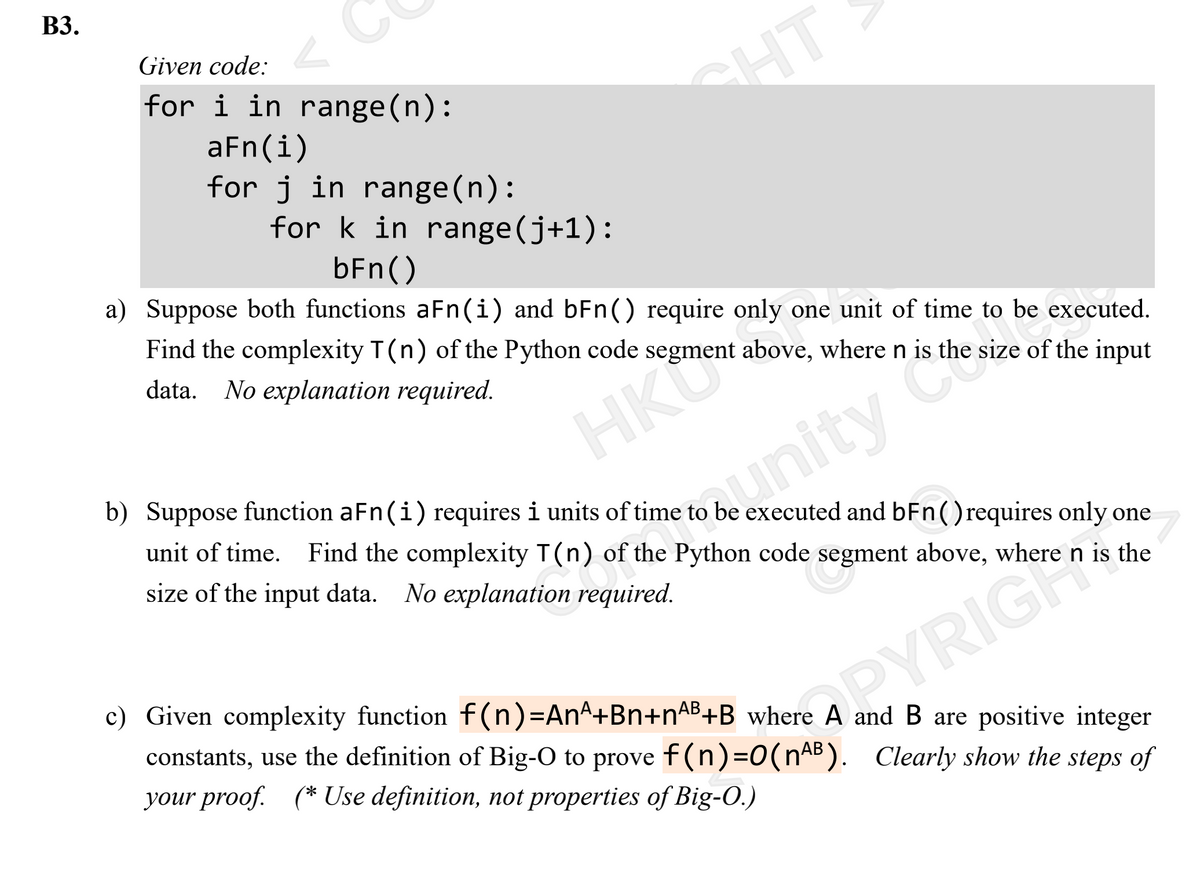В4. Given a sequence of 5 keys < 53, 66, 32, 41, 88 > for searching task: a) Given the hash function H(k) (3.k) mod 7, insert the keys above according to its original order (from left to right) into a hash table of 7 slots. Indicate the cases of collision. Clearly show the steps and calculation with a table. COPY b) In case of any collisions found above in a) part, determine the new slot for each collided case using Linear Probing to solve the collision problem. Clearly show your answer for each identified case. No step of calculation required. H (Answer with “NO collision found", in case there is no collisions found above) c) In case of any collisions found above in a) part, determine the new slot ONLY for the first collided case using Double-Hashing (with functions below) to solve the collision problem. Clearly show the steps of your calculation. di = H(k) (3.k) mod 7 di = (di-1 + ((5•k) mod 6) + 1) mod 7 i 2 2 (Answer with “NO collision found", in case there is no collisions found above)
В4. Given a sequence of 5 keys < 53, 66, 32, 41, 88 > for searching task: a) Given the hash function H(k) (3.k) mod 7, insert the keys above according to its original order (from left to right) into a hash table of 7 slots. Indicate the cases of collision. Clearly show the steps and calculation with a table. COPY b) In case of any collisions found above in a) part, determine the new slot for each collided case using Linear Probing to solve the collision problem. Clearly show your answer for each identified case. No step of calculation required. H (Answer with “NO collision found", in case there is no collisions found above) c) In case of any collisions found above in a) part, determine the new slot ONLY for the first collided case using Double-Hashing (with functions below) to solve the collision problem. Clearly show the steps of your calculation. di = H(k) (3.k) mod 7 di = (di-1 + ((5•k) mod 6) + 1) mod 7 i 2 2 (Answer with “NO collision found", in case there is no collisions found above)
Database System Concepts
7th Edition
ISBN:9780078022159
Author:Abraham Silberschatz Professor, Henry F. Korth, S. Sudarshan
Publisher:Abraham Silberschatz Professor, Henry F. Korth, S. Sudarshan
Chapter1: Introduction
Section: Chapter Questions
Problem 1PE
Related questions
Question

Transcribed Image Text:В4.
Given a sequence of 5 keys < 53, 66, 32, 41, 88 > for searching task:
a)
Given the hash function H(k)
(3.k) mod 7, insert the keys above according to
its original order (from left to right) into a hash table of 7 slots. Indicate the cases of
collision. Clearly show the steps and calculation with a table.
b)
In case of any collisions found above in a) part, determine the new slot for each collided
case using Linear Probing to solve the collision problem. Clearly show your answer for
each identified case.
No step of calculation required.
(Answer with “NO collision found", in case there is no collisions found above)
nity
c)
In case of any collisions found above in a) part, determine the new slot ONLY for the first
collided case using Double-Hashing (with functions below) to solve the collision problem.
Clearly show the steps of your calculation.
di =
H(k) = (3.k) mod 7
(di-1 + ((5.k) mod 6) + 1) mod 7
(Answer with "NO collision found", in case there is no collisions found above)
%3D
di =
i > 2
JT

Transcribed Image Text:ВЗ.
Given code:
for i in range(n):
aFn(i)
for j in range(n):
HT
for k in range(j+1):
bFn()
a) Suppose both functions aFn(i) and bFn() require only one unit of time to be executed.
Find the complexity T(n) of the Python code segment above, where n is the size of the input
data. No explanation required.
HKU
unity Co
b) Suppose function aFn(i) requires i units of time to be executed and bFn() requires only one
unit of time. Find the complexity T(n) of the Python code segment above, where n is the
size of the input data. No explanation required.
c) Given complexity function f(n)=DAn^+Bn+nAB+B where A and B are positive integer
RYRIGH
constants, use the definition of Big-O to prove f(n)=0(nAB). Clearly show the steps of
your proof. (* Use definition, not properties of Big-O.)
Expert Solution
This question has been solved!
Explore an expertly crafted, step-by-step solution for a thorough understanding of key concepts.
Step by step
Solved in 5 steps with 8 images

Knowledge Booster
Learn more about
Need a deep-dive on the concept behind this application? Look no further. Learn more about this topic, computer-science and related others by exploring similar questions and additional content below.Recommended textbooks for you

Database System Concepts
Computer Science
ISBN:
9780078022159
Author:
Abraham Silberschatz Professor, Henry F. Korth, S. Sudarshan
Publisher:
McGraw-Hill Education

Starting Out with Python (4th Edition)
Computer Science
ISBN:
9780134444321
Author:
Tony Gaddis
Publisher:
PEARSON

Digital Fundamentals (11th Edition)
Computer Science
ISBN:
9780132737968
Author:
Thomas L. Floyd
Publisher:
PEARSON

Database System Concepts
Computer Science
ISBN:
9780078022159
Author:
Abraham Silberschatz Professor, Henry F. Korth, S. Sudarshan
Publisher:
McGraw-Hill Education

Starting Out with Python (4th Edition)
Computer Science
ISBN:
9780134444321
Author:
Tony Gaddis
Publisher:
PEARSON

Digital Fundamentals (11th Edition)
Computer Science
ISBN:
9780132737968
Author:
Thomas L. Floyd
Publisher:
PEARSON

C How to Program (8th Edition)
Computer Science
ISBN:
9780133976892
Author:
Paul J. Deitel, Harvey Deitel
Publisher:
PEARSON

Database Systems: Design, Implementation, & Manag…
Computer Science
ISBN:
9781337627900
Author:
Carlos Coronel, Steven Morris
Publisher:
Cengage Learning

Programmable Logic Controllers
Computer Science
ISBN:
9780073373843
Author:
Frank D. Petruzella
Publisher:
McGraw-Hill Education